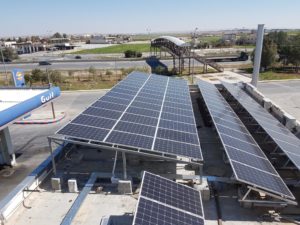 The solar company MIRNA, our long-term Premium Partner from Jordan, has installed a solar plant with 100 kilowatt peak for a gas station located near the capital city Amman. The photovoltaics (PV) plant contributes to the national energy independence strategy of the monarchy in the Middle East.
The solar company MIRNA, our long-term Premium Partner from Jordan, has installed a solar plant with 100 kilowatt peak for a gas station located near the capital city Amman. The photovoltaics (PV) plant contributes to the national energy independence strategy of the monarchy in the Middle East.
353 solar modules facing south have been installed on the roof of the gas station which is located near Queen Alia International Airport. The PV plant is meant to produce around 15,000 kilowatt hours monthly which are feed into the public grid. The PV plant contributes to climate protection with an annual CO2 saving of 59 tons.
To ensure high quality of the components and high yields during the whole life cycle of the plant of approx. 25 years, MIRNA decided on modules from the German system provider IBC SOLAR. The monocrystalline modules of the type IBC MonoSol 295 VL offer high performance at a competitive price. In order to meet high profitability and yield requirements, the modules are subject to the strictest quality requirements that are regularly tested and certified by independent institutes like Fraunhofer ISE. Thanks to a good economic design with high yields, the investor can expect a payback period of 38 months.
Jordan is heavily dependent on energy imports. The national energy independence strategy therefore envisages massively strengthening the expansion of renewable energies and generating a large part of the steadily growing electricity demand of its 7.6 million inhabitants from its own regenerative sources. To this end, the state introduced a Renewable Energy Sources Act in 2012 with technology-specific feed-in tariffs. By 2020, ten percent of the power plant mix is to be covered by renewable energies. Therefore, solar energy is to be expanded to 600 megawatts.